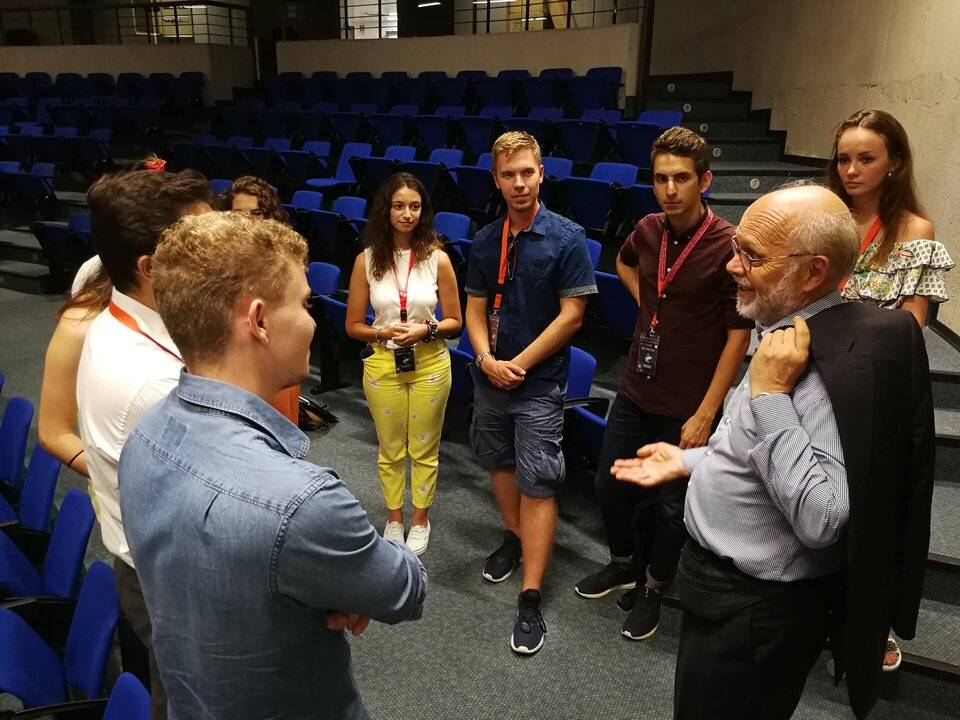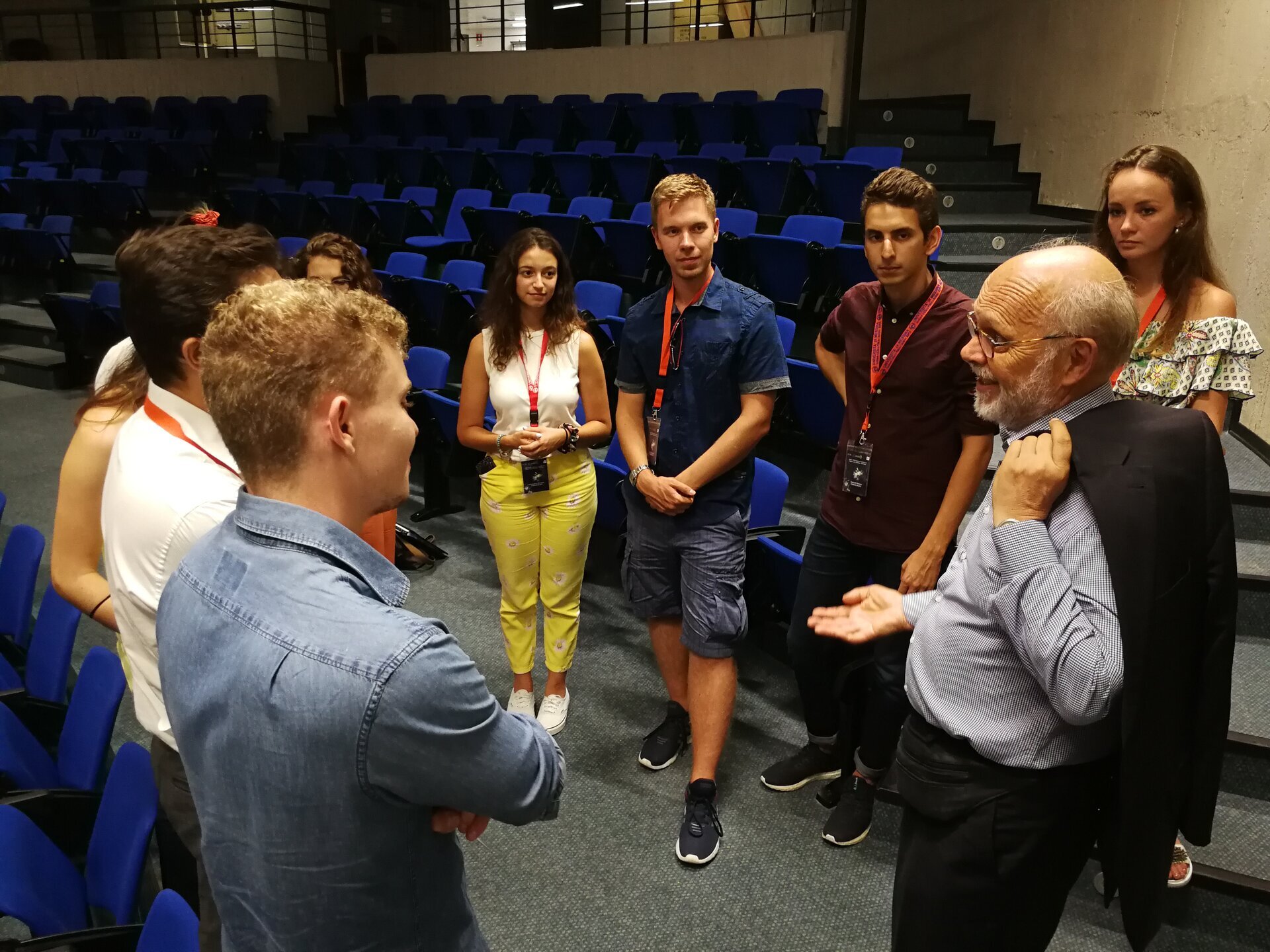"Meet ECSL Members" Series: Armel Kerrest, Professor of Public Law and Vice-Chairman of the ECSL Board
Read our "Meet ECSL Members'" series' latest interview of ECSL Member and vice-chairman of the ECSL Board, Armel Kerrest, who has been involved in nearly every single ECSL Summer Course since its inception.
Read about his views on the importance of cooperation in outer space, the differences between the law of the sea and space law and his passion within this field.

1. Hi Armel, how has your start to the new year been?
The new year is starting with the hope of an end to the pandemic so that we can have our usual human relationships as before.
2. Most of our members know you as the Vice-Chair of the ECSL Board. Can you briefly introduce yourself and your background?
I am a professor of public law in French universities. I first started to teach international law because I wanted to travel and meet people all around the world. I wrote a thesis on International Organisations. I taught at many universities from many countries, advised governments and compagnies and wrote books and articles on space law, law of the sea and Antarctica.
3. What was your first interaction with space law and did this future career in the field?
During my teaching at the university of Western Brittany I started with the law of the sea which was at its highest point of activity and discussions during the IIIrd UN conference on the Law of the Sea. I had the opportunity to write an article on a very special and interesting international cooperation program: Cospas-Sarsat. From the sea I went to outer space to advise the French space agency CNES on the Sea Launch project launching satellite from the high sea. I started working with the ECSL and its founder Gabriel Lafferranderie with a participation to a book celebrating thirty years of the 1967 UN treaty. In 1997 at the Turin world space Congress, I made a presentation at the IISL meeting on the legal aspects of the Sea Launch project which questioned the notion of Launching State and the link of a space activity with responsible and liable States.
4. How has the academic space law landscape changed, from your point of view, in the past few years?
In the eighties and nineties, space law was rather confidential. Only a very small number of international lawyers were involved. Space law was mostly dealing with States military and strategic activities. The entry of private actors modified profoundly the legal framework.
5. What is your favourite part about your work as a researcher and professor?
From the beginning I specialised on liability and responsibility of States for governmental or private activities. I think that Liability is not only to care of indemnification in case of an accident. It has also a preventive effect. If you are liable for an activity, you would be careful and behave properly.
6. As you also have experience in areas like telecommunication law, air law, law of the sea and especially the overarching subject of international law – how do you think that the developments in space law differ from the other areas?
Space activities and consequently space law was a kind of special and exceptional field of activity. The drafting of space law was different from the law of the sea. The activities in the sea were very ancient and a large and precise framework of practices and customary law existed. It is absolutely not the case for space law which had to deal with mostly futuristic activities. The UN law of the Sea Convention adopted in Montego Bay was a consecration of already existing rules. It is not the case with space law which is a corpus of prospective rules and principles.
The major change since the UN treaty of 1967 is that space activities and therefore space law is turning into a more mature and “ordinary” activity. Space law has to follow this evolution, even if, because of the end of the cold war, the evolution of the international society is not in favour of treaties and strong legal compulsory framework anymore.
7. From your experience as an advisor to various national and international organisations, what are some interesting inputs within space policy that have developed within Europe, and also within France specifically?
As a member of the Conseil d’Etat working group, I was involved in the drafting of the 2008 French law on space activities. It was a major step to create a French legal framework to authorise, supervise and support space activities in France. Many other States enacted national legislations making the link between national ordinary rules of law and international principles of space law.
8. Is the way students perceive space law different now than it was in the past?
Yes I think so. Because of the tremendous activities of some billionaires, space law seems to be overwhelmed. In fact, it is a misunderstanding of the real function of space law. Space law, particularly the Outer Space Treaty, only sets principles and does not rule precisely any activity. It plays the role of a constitution setting down principles. A constitution of the end of the XVIIIth century still rules the USA. It has been rarely amended but still finds its place in the US legal order. It is the same for space law. Some people are wanting to change the treaty, real Magna Carta of Outer Space, I think it is mainly to try to destroy some important principle like liability and responsibility of States. These rules prevent for anarchy and protect many. The will of one cannot take the place of the decision of States which are the representatives of the peoples. As sir Winston used to say: democracy is the worst regime apart from all the others. States may be criticised but they are better than the decision of one even if this man is very rich.
9. What are you best experiences with the ECSL?
My best experience with ECSL is the summer course. I took part as a speaker to every of them excluding the first in Messina. Fortunately, in 2019 I had the opportunity to take part to the 28th in the above mentioned town. ECSL summer courses were created by Gabriel Lafferranderie as a link between ESA and European universities. I had the pleasure to organise one in 1998 in Brest, my university. The summer course is a very special opportunity to meet young and enthusiastic lawyers, have discussions and exchanges. Even if I never took part to a summer course as a student, I noticed the good cooperation spirit which I have always seen among students. A good preview of a fruitful international and so needed cooperation.
10. What is one thing you would like to see the ECSL do in the future?
ECSL is on a good path. It should continue to push space law with special regards to international cooperation and better knowledge. The use of modern ways of communication is of course of major interest, nevertheless it should not push away human contacts in the real life which ease a better comprehension between people from various cultural and national backgrounds.
11. France is a very active member state within ESA, and French ECSL members are very active within the activities of the Centre – do you have any advice for students or young professionals specifically wanting to work within space law and policy in France?
France is indeed much involved in space activity, but space is by nature international. My advice to the French members of the ECSL would be to open up to everyone and try to build a world where everyone is respected and enjoys a good place.
12. A return to the Moon is planned in the next few years – do you think this will in any way majorly change the current international legal regime pertaining to the Moon?
Despite what we hear, I think that the 1967 treaty is quite ok to serve as a framework for activities on the moon. It will be a very long time until a return to the moon will have an important economic purpose. The example of what has been done in Antarctica is a good possibility to organise a cooperation between respectful scientists. On the moon, human beings are weak and defenceless - they must cooperate.
When mining will be technically and financially feasible, which is far from now, an international legal regime will be a necessity if we want to avoid aggressions and even war. We have a bad example of colonisation during the XIXth century, which was followed by two destructive world wars. We have a good example with the international cooperation mechanism set in place by the International Seabed Authority. We should prefer international cooperation to privatisation, unilateralism, egoisms and aggressivity.
13. Who do you want us to interview next?
I would suggest Carmen Munoz as the next interviewed.


